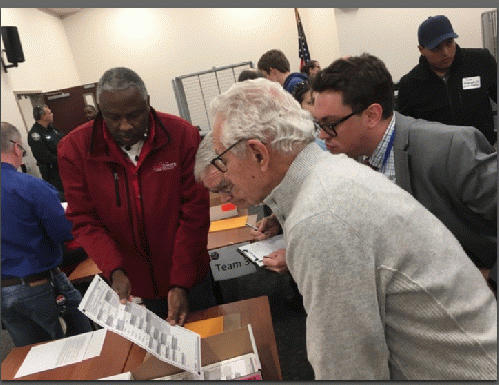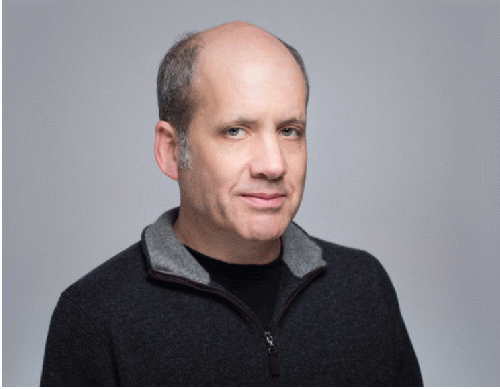My guest today is Steven Rosenfeld, an author, senior writing fellow and chief correspondent of Voting Booth, a project of the Independent Media Institute.
Joan Brunwasser: Welcome back to OpEdNews, Steven. We haven't talked for a while, although I've been following your work. We just had midterms. You've been writing about election issues for years. What's your take on 2018?
Steven Rosenfeld: Thanks for inviting me to share some thoughts. My focus is voting and democracy issues. Stepping back, we saw record-breaking voter turnout for a midterm. That was led by a blue wave. There were something like six million more people voting for Democrats in House races and 16 million more people voting for Democrats in Senate races nationally. Of course, we don't have national popular vote elections, so control of the House flipped, but the Senate did not. That takes us to the many ways our representative system is structured.
But before getting into those distortions and obstructions and remedies, we did see a genuine realignment in some regions. In the midwest, Michigan, Wisconsin, Pennsylvania, Illinois all are again states with Democratic governors. That means they can veto political maps that might otherwise be another decade of GOP gerrymanders in the 2020s. Not so with what ended up happening in Georgia, Florida and Texas. But those states are approaching political tipping points. In Florida, 1.5 million ex-felons will be able to vote in 2020. If only 10 percent had that opportunity in 2018, the state would have likely elected a Democratic governor and senator.
So I see all that on the political horizon. And then I have a deeper focus on how people are and aren't able to vote, have those votes count, and the ways that counting the vote can be more accurate and transparent and believable. That last focus is especially important to me, as we are living in a political era where facts and trust are losing out to feelings and propaganda.
JB: I agree with everything you just said. What did we see in this election regarding voting, having the votes counted as cast and the amount of transparency, not to mention verifiability? Let's start with the first two aspects: who can vote and how those votes are counted, please.
SR: Well, we live in two Americas when it comes to who can vote, even with the advent of online registration in three-quarters of the states and automatic registration for those getting a driver's license in a dozen states. What I saw this fall in some red-run states was a stubborn slowness of sending the latest address changes from DMVs to state and county election officials. This was in Arizona, Georgia and Missouri. That delay creates a collision with other voting protocols where people ended up not being correctly listed in poll books, or not getting a mail-in ballot at their current address, and then having to show IDs to validate their votes. There were other voter suppression tactics in play in a handful of states. Above all, Georgia was 2018's poster child: large aggressive purges; many complexities to get a ballot; many hurdles to validate it, little recourse without federal court intervention, etc.
On the vote counting side, we saw different issues. In a dozen states, including Georgia, most of the public is voting on very old entirely electronic machinery--DREs. That means there isn't any audit or verification possible. What you have saved on memory cards is it. On the other hand, three-quarters of the country is now using paper ballots. That's an improvement. But it's not a cure-all.
In Florida, they vote on paper ballots. The votes are read and tallied by scanners. As you saw, they had three simultaneous statewide recounts in a narrow time frame. Some large counties with more modern systems could not handle the volume and complexities. The recounts' goal was not a full or complete accounting of every ballot and all votes. It was examining categories of questionable ballots until it became clear who won the tightest contests. Amazingly, some counties had better technology on hand, but it wasn't certified for use in recounts.
JB: Let's zero in on one aspect of your last comment: voter disenfranchisement. On a local level, elected officials have an outsize effect on elections, for instance, in terms of validating or excluding voters beyond the deliberate slow-down of new voter registration you just mentioned. I've read that legal Georgia voters were disenfranchised by the hundreds of thousands prior to the recent midterms. The vote margin was a tiny fraction of that amount.
And, to add insult to injury, this wholesale voter purge was accomplished by the secretary of state who was also running for governor in a very close race. How can we neutralize voter disenfranchisement, which is often wielded on a massive scale? It can't help but affect the "official" results, despite protestations to the contrary by the press and election officials. And is there ultimately anything voters can do if they feel that the official results are incorrect?

Leon County Florida conducting the hand-count phase of the 2018 recounts.
(Image by courtesy of Steven Rosenfeld) Details DMCA
SR: Watching what was unfolding in Georgia, before and after Election Day, was like traveling back to 2004 in Ohio for me. Before Election Day, you had large voter purges, pressing the letter of the law on that to the very limits. Then comes Election Day, not properly preparing for turnout, including the predictable snafus that follow from the state's deliberate and prior missteps on how it handles--maybe better to say mishandled--the most recent voter registration information. And then relying on imprecise but aggressive standards to reject many of the paper ballots that were submitted: mail-in and provisional ballots. In almost every instance, the state did not give the benefit of the doubt (including state-generated doubts) to otherwise eligible and legal voters. These added up to four federal court rulings against the state to rectify unreasonable protocols, all of which shared a common feature: not giving the voter a chance to fix what the state said was incorrect. All of these hurdles add up to voter suppression.
I saw Georgia as utterly self-conflicted. On one hand, it has automatic registration (unlike 3/4ths of the states) and online registration (both of which are better than New York). Yet on the other hand, it takes away, via massive purges and voter disqualification protocols, what it has just given. There is a special runoff election for Secretary of State coming up. If a Democrat is elected, that may do a lot to address the administrative directives that are most harmful.
(Note: You can view every article as one long page if you sign up as an Advocate Member, or higher).






